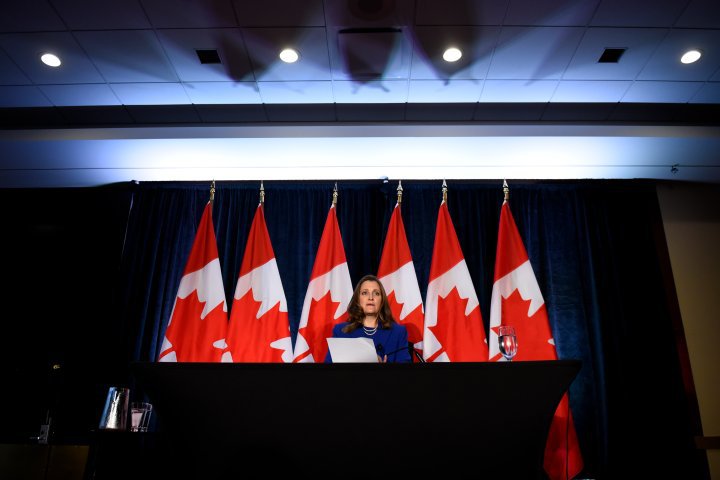Russian assets must be seized; accounts of sexual violence ‘chilling’: Freeland

Deputy Prime Minister and Finance Minister Chrystia Freeland says there is no better source of extra funds for Ukraine‘s recovery from the Russian invasion than from the assets of those backing the war.
In an interview with The West Block‘s Mercedes Stephenson, Freeland emphasized the proposal in the budget she tabled last week that would allow Canada’s minister of foreign affairs to not only freeze Russian assets, but seize them, too.
“Right now, we can freeze assets. What we need to do is have the power to seize those assets,” she said.
“Ukraine is going to need to be rebuilt. And I can think of no more appropriate source of funding for that rebuilding than the seized assets of the Russian central bank and of Russian oligarchs.”
Russian President Vladimir Putin invaded Ukraine without cause on Feb. 24, 2022.
Scores are dead as a result, and the scale of the Russian butchery of Ukrainian civilians has horrified the world and sparked the most direct challenge to the basic tenets of international law since the Second World War.
Last month, Canada and allies formed the Russian Elites, Proxies and Oligarchs (REPO) Taskforce as part of a bid to seize and forfeit the assets and wealth of individuals backing Putin’s unprovoked invasion.
As part of that, the budget announced “the government’s intent to clarify the ability of the Minister of Foreign Affairs to cause the forfeiture and disposal of assets held by sanctioned individuals and entities to support Canada’s participation in the REPO Taskforce.”
Freeland said it is an effort to encourage allies to take similar steps to boost their own powers, and that it complements the budget commitment of $500 million in additional military aid to Ukraine this year.
“I think that it is so important for us to recognize that what is happening is an atrocity and it’s happening right now. And I think far worse things are happening than even what we see in the terrible pictures,” she added.
“There is systematic rapes of women in Ukraine are happening, and the accounts I’ve read are just blood-chilling. But it’s important to face that, to talk about it, and then be very clear about what we need to do to stop it.”
Accounts of Russian soldiers raping Ukrainian women are growing.
Human Rights Watch along with journalists at The Guardian, The New York Times, and The Times of London have published horrifying reports about repeated rapes and sexual violence as a weapon of war.
Rape and sexual assault are war crimes under international law.
Russia’s invasion of Ukraine has also caused spillover into the broader global economy, roiling supply chains already struggling to right themselves after the turmoil of the COVID-19 pandemic.
The uncertainty and volatility of that spillover — spurring inflation higher, upping gas and fuel prices, and further raising the costs of consumer products and foodstuffs — was a central theme in the budget tabled by Freeland last week as well.
In all, the budget mentioned Russia a total of 57 times and Ukraine 59 times.
In that budget — her second of the pandemic era — Freeland emphasized the need to brace for continued uncertainty amid inflation that is expected to remain high into next year.
“We started turning off the COVID support measures in October, and that was a very important moment. I was conscious then of its importance,” Freeland said.
“This budget is sort of the moment when I stepped on the clutch and I slammed it into a different gear.”
The budget marks the first test of the governance deal struck between the Liberals and the NDP in April.
That arrangement is what’s known as a confidence and supply agreement, and it is different from the definition of a coalition government because in formal coalitions, MPs from more than one party hold posts as ministers around the cabinet table.
NDP Leader Jagmeet Singh said on Thursday that the budget hit enough of the targets needed for his party’s support to continue, but criticized the lack of clear boosts to health care spending.
In particular, he had called for increases to health care transfers and more money specifically for long-term care facilities, which have been hit hard during the pandemic.
“We’ve seen our health care be pushed to the brink of collapse a number of times in this pandemic, and we also know that long-term care is in vital need of support,” he said.
“We think it’s wrong and we’ll continue to raise those concerns.”
Overall, one expert described it to Global News as “modest,” marking a shift from an era marked by large-scale, emergency government spending to a transition period where inflation is — hopefully — a short-term phenomenon amid the turbulence of the current global economic upheaval.
And while the government laid out plans for billions in new spending, the budget was a marked departure from the massive levels of emergency spending that characterized the previous two years.
Conservative associate finance critic Dan Albas, though, pointed to a lack of clear measures to tackle that inflation, which the budget forecast will likely continue to run high into next year.
“Right now, the Bank of Canada is trying to fight inflation,” he said, pointing to interest rate increases. “But this government is actually pushing more money into the economy and making that problem worse.”
Albas said proposals like a two-year ban on most foreign buyers equates to a “Swiss cheese policy” because it allows for exemptions like individuals separating from spouses.
“So there’s not actually a ban here,” he said. “All it is is a ban in name.”
Freeland said there remains much work to do on collaborating with provinces and territories.
by Global News







